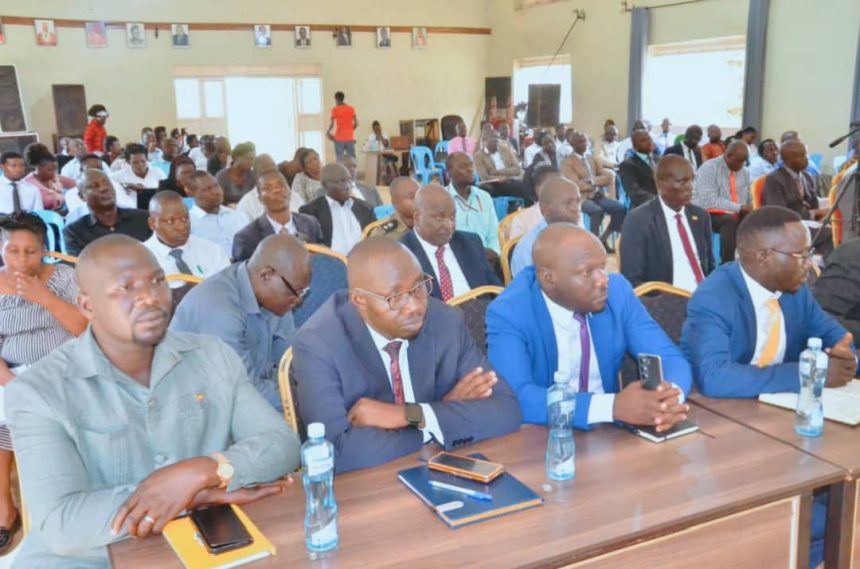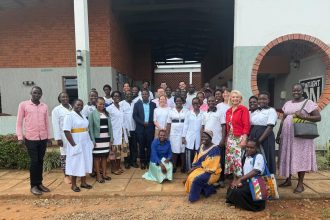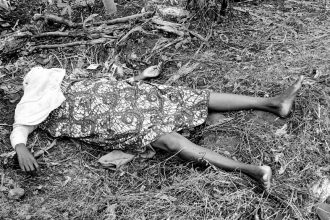Senior government officials from the Office of the President have convened a crucial meeting with political, technical, religious, and civil society leaders in Lira City, emphasizing the critical need for teamwork, accountability, and robust citizen engagement to enhance the delivery of public services.
The high-level engagement, held on Friday in Lira City, was spearheaded by Maj. Martha Asiimwe, Head of the RDC Secretariat and Anti-Corruption Unit (ACU), alongside her deputy Dr. Str Akiror MaryGrace, and Lt Col (Rtd) Ambako Kibrai, Senior Presidential Advisor on Mobilisation. The primary objective of the meeting was to assess the impact of government programmes at the grassroots level.
During a mobilisation session, Lt Col (Rtd) Kibrai voiced concerns regarding persistent illegal surcharges in schools, asserting that these practices directly contravene the government’s policy on free primary and secondary education.
“The government is committed to funding tuition, facilities, and essential learning materials. The sole responsibility of parents should be providing meals,” Kibrai stated. “The continued imposition of additional fees places an undue burden on families and undermines the fundamental principles of Universal Primary and Secondary Education.”
Lt Col (Rtd) Kibrai also pointed out significant deficiencies within the Education Management Information System (EMIS), which currently tracks initial student enrollment but fails to monitor their progress throughout the entire education cycle. He highlighted the alarming statistic that only approximately 600,000 out of one million pupils who enroll in Primary One successfully complete Primary Seven.
“Where do the remaining 400,000 students disappear to? Who is ultimately accountable for this significant dropout rate? We must collectively examine the roles of parents, teachers, and local leaders in ensuring that children remain in school,” Kibrai passionately urged.
Acknowledging the government’s efforts in supplying essential medicines to health facilities, Lt Col (Rtd) Kibrai, however, lamented the recurring issue of stockouts. He stressed the importance of transparent communication between health workers and patients when medicine shortages occur, emphasizing that a lack of openness only fuels public frustration. Furthermore, he advocated for intensified grassroots mobilisation to raise public awareness about primary healthcare services and to rebuild trust within the community.
Dr. Akiror reminded the assembled leaders that the RDC Secretariat was established in 2018 by President Museveni with a dual mandate: to combat corruption and to diligently monitor and improve the effectiveness of service delivery.
“Today, our primary focus is on the crucial aspect of service delivery, not solely on our anti-corruption mandate. Our citizens are in dire need of essential services, and it is our fundamental duty as public servants to ensure that every resource allocated by the government is utilized for its intended purpose,” Dr. Akiror asserted.
She issued a strong challenge to public servants to be consistently present in their roles, deeply committed to their responsibilities, and directly accountable to the citizens they serve.
“We are witnessing instances of officers who are frequently absent from their duty stations yet fully expect their salaries at the end of each month. For what tangible service are they being compensated?” she questioned pointedly. “This engagement serves as a critical wake-up call for each and every one of us to reflect deeply on the legacy we will ultimately leave behind.”
Dr. Akiror underscored the inevitable accountability that every public official will face, both to the people they serve and to their own conscience.
“If a patient tragically loses their life due to the absence of a doctor who should have been on duty, who bears the ultimate responsibility for that irreplaceable life? These are the uncomfortable truths that we must confront head-on,” she emphasized.
Maj. Asiimwe reinforced the urgent call for collective responsibility among all stakeholders. She also commended the noticeable improvements in the security situation within Lira City, attributing this positive development to the effective leadership at the local level.
“While our operations fall directly under the purview of the Office of the President, and our work may at times appear political due to its anchoring at the highest political echelons of the country, our core mission remains the mobilisation of citizens towards achieving better livelihoods,” Maj. Asiimwe clarified.
She lauded the Lira City Clerk for his demonstrated effectiveness and urged all leaders to leverage such positive capacities for the greater common good of the community.
“Difficult times are transient, but resilient and united teams endure. Government efforts alone are insufficient. We urgently need unwavering unity among mayors, technical officers, Resident District Commissioners (RDCs), and all community members to transform effective service delivery from an aspiration into a tangible reality,” Maj. Asiimwe stressed.
She further emphasised that all facets of leadership – political, technical, and religious – must operate in seamless unison and ensure clear and consistent communication with the citizenry.
“Delivering essential services without adequately informing the people they are intended for is akin to pouring precious water into a container that remains perpetually untouched. Information is not a mere luxury; it is an indispensable component of the service delivery process itself,” she articulated.
Lira City was strategically chosen as the initial point for this crucial mobilisation campaign due to its pivotal geographical and political significance within the broader Lango Sub-region.
“By commencing our efforts at the central hub, we are confident that the vital message of unity and accountability will effectively cascade to the surrounding peripheral areas. From Lira, our voice will resonate across Amolatar, Otuke, Alebtong, and beyond,” Maj. Asiimwe affirmed.
The mobilisation meeting concluded with a resolute call to action for all stakeholders to transcend any existing differences, refrain from politicising inherent challenges, and instead dedicate their collective energies towards identifying and implementing practical and sustainable solutions aimed at significantly improving service delivery for the ultimate benefit of all Ugandans.



















